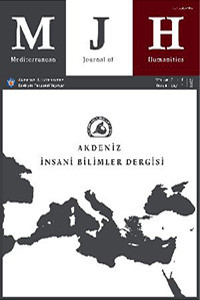Öz
An intellectual as a public figure contributes to the world of ideas and plays a key role in the politics of his or her own society. It has always been hard to define the intellectual as a productive and beneficial identity for society. Jonathan Swift questioned the politics of his time and of the place of the intellectual in it, questioned who the intellectual was and why he or she deserved to be called one in Gulliver’s Travels. Gulliver’s Travels suggests alternative worlds in which academics are depicted as spoof figures, profane spokespersons of scientific knowledge. Lemuel Gulliver is a political figure who has to analyse and interpret the political atmosphere of the fantastic lands to which he travels. The aim of this study was to analyse how the difficulties of intellectuals are translated in Gulliver’s Travels into politically falsifying amendments of true knowledge and question what kind of political atmosphere these falsifications create. This paper also interprets these elements in contemporary political terms within Foucauldian concepts of power and Bakhtinian concepts of laughter through a cross cultural reading of Swift in comparison to the texts of the Czech writers Milan Kundera and Franz Kafka, and the Turkish writers Oya Baydar and Aziz Nesin.
Anahtar Kelimeler
Kaynakça
- Ashcroft B., Griffiths G. & Tiffin H. (2006). “General Introduction”. Eds. B. Ashcroft, G. Griffiths & H. Tiffin, The Post-Colonial Studies Reader (20062) 1-13. London & New York.
- Bakhtin M. Rabelais and His World. (1984). Trans. H. Islowsky. Bloomington 1984.
- Çelikel M. A. (2014). “Annihilation of History and Fear of the Past in Oya Baydar’s The General of the Garbage Dump”. Edebiyat Fakültesi Dergisi 31/1 (Haziran 2014) 125-36.
- Foucault M. (2000). Power. Ed. J. D. Faubion. New York 2000.
- Kafka F. (1987). The Trial. Trans. W. Muir & E. Muir. London 1987.
- Kundera M. (1983). The Book of Laughter and Forgetting. Trans. M. H. Heim. London 1983.
- Mbembe A. (2006). “The Intimacy of Tyranny”. Eds. B. Ashcroft, G. Griffiths & H. Tiffin, The Post-Colonial Studies Reader (20062) 66-69. London & New York.
- Ross A. (2008). “Introduction”. Major Works (2008) xi-xxviii. Oxford.
- Said E. (2002) “The Public Role of Writers and Intellectuals”. Ed. H. Small, The Public Intellectual (2002) 19-39. Oxford.
- Swift J. (1994). Gulliver’s Travels. London 1994.
Ayrıntılar
| Birincil Dil | Türkçe |
|---|---|
| Konular | Dil Çalışmaları (Diğer) |
| Bölüm | Araştırma Makaleleri |
| Yazarlar | |
| Yayımlanma Tarihi | 30 Haziran 2017 |
| Yayımlandığı Sayı | Yıl 2017 Cilt: 7 Sayı: 1 |

